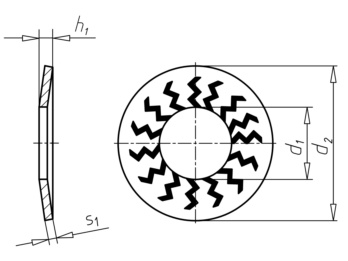Locking disc spring washer, shape Z A4 stainless steel, plain
A4 stainless steel, type Z
WSH-SER-A4-Z-D12,4
Price for selected packaging unit

Exclusively for trade customers
Register now and access more than 125,000 products
- Type Z: for cheese head and hexagon socket screws
- From a technical point of view and due to the installation space, the spring properties of this type are significantly lower
- Protection type: Screw retainer
- A4 stainless steel material number 1.4401
- Friction locking thanks to spring force
- Mechanical interlock thanks to specific surface stamping
- Protects the counter surface from damage (washer does not turn during installation)
- Minimal tightening torque distribution
Product information
Datasheets(X)
CAD data (available after login)
Application area
Machine and system construction, drive technology, conveyor technology, commercial vehicles, construction machines, vehicle construction, agricultural technology, the food industry etc.
 | |
Suitable for screw thread | M12 |
Internal diameter (d1) | 12.4 mm |
Outer diameter (d2) | 18.3 mm |
Height (h1) | 2.4 mm |
Thickness (s1) | 1.8 mm |
Material | Stainless steel A4 |
Surface | Plain |
RoHS-compliant | Yes |
Form | Z |
Suitable for | Cylinder head and hexagon head bolts with normal head contact |
Locking device operating principle | Serrated lock washer |
Locking function | Embedding locking device |
Comparison of locking disc spring washers and lock washers | |
| Locking disc spring washer | Lock washer with no DIN standard |
| + Twice as secure: spring-secured friction fit and positive locking + Minimal tightening torque distribution + Application range up to approx. 350°C + Reusable + Protection of the counter surface; no turning | Without a DIN standard, lock washers become a safety risk! - Very high tightening torque distribution - Only suitable for locking screws 5.8 - In the worst case scenario, lock washers can wear through surfaces and thereby promote a drop in the preload force. - No protection against unscrewing - Lock washers are not reusable - Lock washers tend to expand (risk of breakage) - They turn during tightening and loosening -> This damages the surface/counter surface |

















